 Global ambassadors of ecotourism gather in Nanjing
Global ambassadors of ecotourism gather in Nanjing
 Taiwan woman marries into Kazak family, 100 sheep plus a flat as dowry
Taiwan woman marries into Kazak family, 100 sheep plus a flat as dowry
 College girls take graduation photos under water in Chongqing
College girls take graduation photos under water in Chongqing
 Cartoon: Xi and football
Cartoon: Xi and football
 Chinese influence sweeps ROK
Chinese influence sweeps ROK
 Post-90s beauty boxer grapples four men
Post-90s beauty boxer grapples four men
 3,000-year-old tea town through lenses
3,000-year-old tea town through lenses
 22 archaeological sites along Silk Road in China
22 archaeological sites along Silk Road in China
 Football babies, Samba dancers embrace 'World Cup'
Football babies, Samba dancers embrace 'World Cup'
 Beautiful scenery along China’s Grand Canal
Beautiful scenery along China’s Grand Canal
TOKYO, July 9 -- Japanese Prime Minister Shinzo Abe's move to allow Japan's Self-Defense Forces to exercise right to collective self-defense through reinterpreting the country's pacifism Constitution failed to obtain understanding at home and abroad, according to surveys by Japanese media.
After a survey on editorials released by 43 domestic newspapers on July 2, only three local newspapers in Ishikawa, Toyama and Fukushima prefectures showed their support to the Abe administration's approval to the collective defense, according to Japan's popular Asahi Shimbun Wednesday.
The Akita-based Sakigake Shimpo criticized in its editorial that the postwar peaceful path Japan followed for seven decades was overturned by current ruling bloc through their 13-hour negotiations and makes Japan a country that could wage a war.
The Okinawa Times described Abe's move on the collective defense as a coup against the country's war-renouncing Constitution, adding the move will further make Okinawa a military fortress and raise concerns that the Okinawa people will be dragged into war again.
According to the survey, among the six major national newspapers, the Asahi Shimbun, the Mainichi Shimbun and the Tokyo Shimbun oppose to lift the constitutional ban on the collective defense, while the Yomiuri Shimbun, the Sankei Shimbun and the Nikkei Shimbun support the government decision.
In Tuesday's survey on international opinions on the controversial issue, the Nikkei Shimbun concluded that Japan's decision on collective defense did not acquire understandings worldwide.
The newspaper said that a majority of overseas media tended to question that Abe made the decision without discussion with Japanese people and the move would exacerbate Japan's frayed relations with China and South Korea.
Although some U.S. media like FOX television supported Japan's move through citing exports'remarks, the mainstream Western media maintained a passive attitude toward the issue, adding even the New York Times, a prestigious paper of the United States, Japan's key ally, criticized Abe's move in an editorial, the survey said.
 'Seattle's soulmate' - -Pike Place Market
'Seattle's soulmate' - -Pike Place Market Human skeletons of more than 1,600 years old
Human skeletons of more than 1,600 years old BFA goddess poses for graduation photos
BFA goddess poses for graduation photos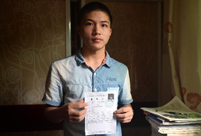 Separate college entrance exam
Separate college entrance exam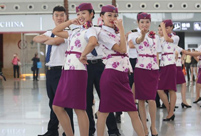 Flash mob dance
Flash mob dance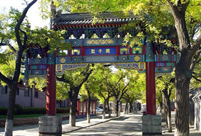 Featured hutongs in Beijing
Featured hutongs in Beijing Picturesque scenery of Ghost City
Picturesque scenery of Ghost City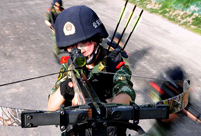 Female special assault team in training
Female special assault team in training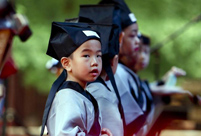 Children attend First Writing Ceremony
Children attend First Writing Ceremony Chengdu police use social media to boost recruitment
Chengdu police use social media to boost recruitment Secrets unveiled in restoration of the 800-yr-old Buddha
Secrets unveiled in restoration of the 800-yr-old Buddha Heavenly path in Chongli grassland
Heavenly path in Chongli grassland Happy Birthday to "Yuanzai"
Happy Birthday to "Yuanzai" China's manned submersible Jiaolong opens to public
China's manned submersible Jiaolong opens to public Roast Duck Restaurant celebrates 150th anniversary
Roast Duck Restaurant celebrates 150th anniversaryDay|Week|Month